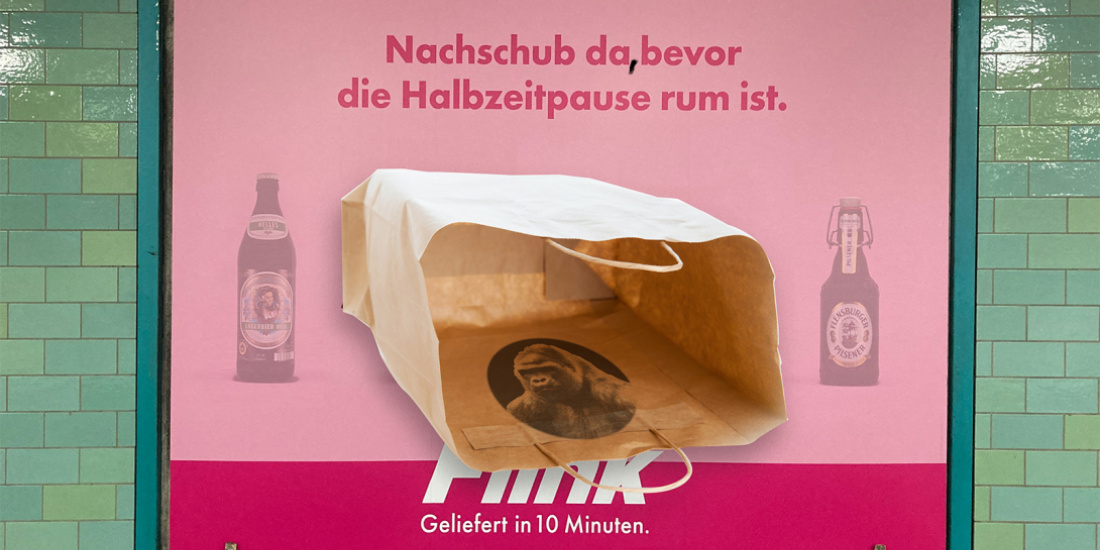“Supplies here before the half-time break is over.”
That's the bold slogan of one of these platforms - and it challenged us to put it to the test: Does the advertising promise also apply to people who rely on assistive technologies? How “nimble” can blind people really be when buying online and having a simple bottle of Coke Zero delivered, for example?
The result: with one of the three providers tested, the industry giant Gorillas, a delivery order could not even be placed. (However, this simple realization was only reached after what felt like an eternity and many detours!) But the other two apps were also full of obstacles and time-consuming.
Half-time break is not enough to send an order
As a reminder: a half-time break lasts 15 minutes. We don't doubt whether the delivery services keep to their announced delivery time - and this has already been tested many times elsewhere. We just wanted to know whether the ordering process alone would put us offside.
Score: If blind new customers want to receive their delivery for the second half, they have to start setting up an account in the app no later than half an hour after kick-off. In other words, the duration of a half-time break is not enough!
For people who are dependent on screen readers due to their visual impairment, it takes - even in the most experienced
Aufzeichnung des Gorillas-Tests
Aufzeichnung des Flink-Tests
Aufzeichnung des Getir-Tests
The most common problems
No, inadequate or even incorrect labeling of form elements, lack of feedback when pressing buttons, incorrect voice output or labeling, pop-ups and overlays that are not accessible for assistive technologies ... - these obstacles were more or less present in all three apps in several places. In the cumbersome registration process (with the many required entries), the hurdles became a hopeless dead end for the market leader and a time trap for the other two portals.
Statement from Flink (25.11.2021)
We informed all three companies about our test results prior to our press release. Public Affairs Lead Christoph Egels from Flink replied to us just one day later:
“You're absolutely right, we still have a lot to do here. However, Flink is still a very young company and is constantly working on improving and eliminating problems. We want to be able to serve the whole of society in the future and not exclude anyone. We also know that our offer, if implemented optimally, can be very useful to blind and visually impaired people in everyday life. You can therefore rest assured that we are working on making our app as inclusive as possible.
After a brief consultation with our product team, I can inform you that both our web stores and the app will be checked for usability with screen readers and visual components such as color contrast and text size adjustment in accordance with WCAG standards. The next step is to develop a plan for improving usability in compliance with the European Accessibility Act.
We will initiate these steps in Q1 2022.”
This reaction is very pleasing - also because it has so far remained the exception. We take the company at its word, remain in contact and will review the promised improvements in due course.
Test scenario
Thinking Aloud is a common user test method used to detect problems when using a web application, for example, by speaking out loud and recording thoughts and feelings while performing a task. These tests are usually only carried out with sighted test subjects.
In our usability tests, the test subjects use assistive technologies. Team members are present via digital conference and record the Thinking-Aloud protocols. The audio video file and a written evaluation show the individual stumbling blocks of the website. Incidentally, the name Usabilitally is a contraction of usability and accessibility with the common abbreviation A11y.
To get an idea of how to work with a notebook without sight, what aids are available and what the most common obstacles are for them on the World Wide Web, we recommend our blog posts How blind people use computers and Barriers to Internet use.
About us
The Gesellschaft zur Entwicklung von Dingen realizes solutions for digital sovereignty using open source software. The guiding principles of its work are sustainability and system security, accessibility and data protection. By specializing in different business areas, the company has a broad and versatile base. Typical for the team members: they think outside the box and ask smart questions.
In addition to usability tests, the Broken Image division also offers classic accessibility tests, e.g. expert opinions in accordance with BITV or WCAG, as well as the creation and monitoring of accessibility declarations. And advice on how to do it better and support with implementation - that is of course also offered.
Society for the Development of Things, Osloer Straße 17, D-13359 Berlin
Press contact and material: www.gzevd.de/presse
